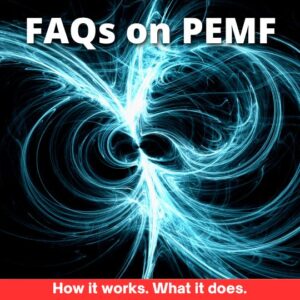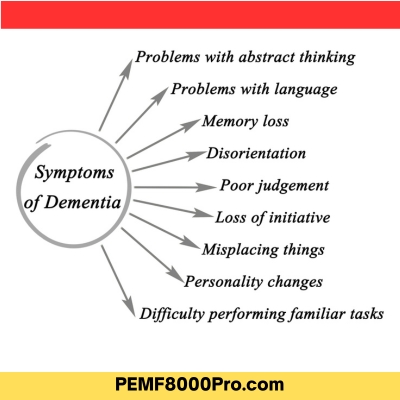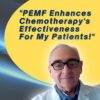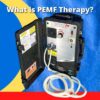Dementia and PEMF Therapy –
How a PEMF Machine Helped Jana Get Her Life Back!
After experiencing multiple head traumas, Jana’s neurologist diagnosed her with end-stage dementia. After the latest brain injury she experienced very low cognitive function, memory issues, great difficulty walking, blurred vision, headaches, and developed neuropathy and numbness throughout her body. Jana was walking with a cane, spent most of her time in bed and suffered from dizziness and exhaustion, frequently.
Watch her video interview as she explains how she eventually overcame many of these debilitating symptoms in part, by using Pulsed Electromagnetic Field Therapy (PEMF).
Prior to her head traumas, Jana was a runner, horse riding enthusiast and enjoying an all-around active lifestyle. As devastating as her story might seem, how Jana faced these challenges is quite amazing! Jana discovered the benefits of using PEMF to help address her symptoms while she was using PEMF to treat her horse.
“PEMF was the ONLY thing I did to heal my brain!”
What is Dementia – How it is Treated?
Dementia is a term used to describe a range of progressive neurological disorders that affect memory, thinking, and behavior. It is a chronic condition that typically develops over time or after a traumatic event, with symptoms becoming more severe as the disease progresses. Dementia is a complex and challenging disease that affects millions of people worldwide.
The Symptoms of Dementia
Dementia is a term that describes a group of symptoms associated with a decline in cognitive function. The most common symptoms of dementia include memory loss, difficulty with language, difficulty with problem-solving, and changes in mood or behavior. There are several types of dementia, including Alzheimer’s disease, vascular dementia, Lewy body dementia, and frontotemporal dementia. See the video above to learn how Jana used the PEMF8000 Pro to manage her dementia symptoms and help her to find a level of healing she didn’t think was possible.
How Dementia is Diagnosed
The diagnosis of dementia involves a series of tests and assessments designed to evaluate cognitive function and rule out other conditions that may be causing the symptoms. These tests may include a neurological exam, cognitive tests, brain imaging studies, and blood tests. A diagnosis of dementia can be challenging, as many of the symptoms of dementia can also be present in other conditions, such as depression, anxiety, or medication side effects.
“Within weeks I was walking unassisted, started being able to speak more clearly, remember things… the headaches were going away.”
Dementia’s Cause
The exact cause of dementia is not yet fully understood, but it is believed to be related to a combination of genetic, environmental, and lifestyle factors. Age is a significant risk factor for dementia, with the risk of developing dementia increasing significantly after the age of 65. Other risk factors for dementia include a family history of the disease, high blood pressure, high cholesterol, and a history of head injury.
How can PEMF therapy help with dementia?
While there is currently no cure for dementia, there are several treatment methods available that can help manage symptoms and improve quality of life. The most common treatments for dementia include medication, behavioral therapy, and lifestyle changes. PEMF is a promising treatment method that has been shown to be effective in reducing inflammation and improving cognitive function in patients with dementia.
End-Stage Dementia
Jana referenced that she was in end-stage dementia after her latest brain injury. End-stage dementia is a term used to describe the final stage of the disease, where the individual is no longer able to communicate effectively, and their cognitive function has declined significantly.
In the end-stage of dementia, individuals may require around-the-clock care and assistance with basic activities of daily living, such as bathing, dressing, and feeding. Jana definitely experienced many of these symptoms prior to her experience with PEMF.
New research on dementia is giving us hope for treating this disease. Several studies are currently underway to investigate the potential of new medications and therapies to slow or even halt the progression of dementia. One promising area of research is the use of stem cell therapy to regenerate damaged brain tissue and improve cognitive function in patients with dementia.
In the United States, it is estimated that approximately 5.8 million people are living with dementia…
In the United States, it is estimated that approximately 5.8 million people are living with dementia, with Alzheimer’s disease being the most common type of dementia. Dementia is more common in women than men, and the risk of developing dementia increases with age.
Sometimes people incorrectly use the terms Alzheimer’s Disease and dementia interchangeably. While Alzheimer’s disease is a specific type of dementia, it is important to recognize that dementia is a general term that can refer to a range of conditions.
Understanding the differences between Alzheimer’s disease and dementia can help individuals better understand their diagnosis and develop an appropriate treatment plan.
Here is a comparison of Alzheimer’s disease and dementia:
| Alzheimer’s Disease | Dementia |
| A specific type of dementia that affects memory, thinking, and behavior. | A general term that describes a decline in cognitive function. |
| Accounts for 60-80% of dementia cases. | Can be caused by a variety of underlying conditions. |
| Develops over time and progresses slowly. | Can develop rapidly or gradually, depending on the underlying cause. |
| Typically affects older adults, with the risk increasing significantly after age 65. | Can affect individuals of any age, but is more common in older adults. |
| Exact cause is not fully understood, but is believed to involve a combination of genetic, environmental, and lifestyle factors. | Can be caused by a variety of underlying conditions, including Alzheimer’s disease, vascular dementia, Lewy body dementia, and frontotemporal dementia. |
| Common symptoms include memory loss, difficulty with language, difficulty with problem-solving, and changes in mood or behavior. | Symptoms can vary depending on the underlying cause, but often include a decline in cognitive function and changes in mood or behavior. |
| Currently no cure, but several treatment methods available to manage symptoms and improve quality of life. | Treatment depends on the underlying cause and may include medication, behavioral therapy, and lifestyle changes. |
There are many resources available for individuals and families affected by dementia or Alzheimer’s disease. Organizations such as the Alzheimer’s Association offer a wealth of information and support, including education programs, support groups, and caregiver resources.
Always check with your doctor before beginning any treatment program for any health issue.
– – – –
See what our REVIEWS say about PEMF and how it has changed their lives!
 Pulsed Electromagnetic Field Therapy works. Our technology simply has more power and works better than the rest.
Pulsed Electromagnetic Field Therapy works. Our technology simply has more power and works better than the rest.
For home, ranch, or healthcare practitioners.
Call us with ANY questions!
844.879.7363
Join Our Mailing List!
We never share your info. Opt out any time. Please confirm in your email! If you’re already signed up or have a specific question use the “Contact” page.


